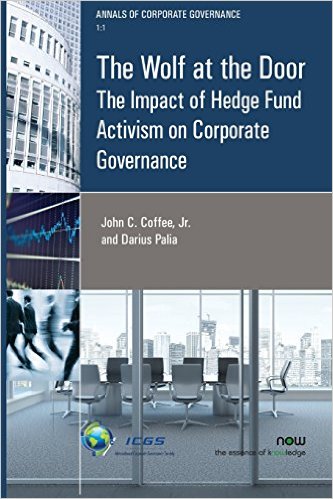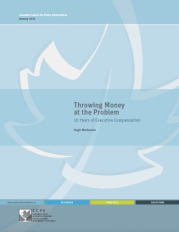engagement et activisme actionnarial Gouvernance normes de droit Nouvelles diverses rémunération
Futures assemblées annuelles : que va changer le say on pay ?
Ivan Tchotourian 26 janvier 2017
Dans un article de Le Revenu (24 janvier 2017), Alain Chaigneau propose une intéressante synthèse des implications du vote de la loi Sapin II sur la rémunération des hauts dirigeants (et l’adoption du fameux say on pay) : « Un contrôle encore plus serré de la rémunération des dirigeants ».
Cette année, lors des assemblées générales, le contrôle de la rémunération des entreprises cotées en Bourse va encore se durcir. Les actionnaires avaient déjà leur mot à dire en la matière, sous forme du fameux « say on pay ».
Mais la loi dite Sapin 2 (transparence, lutte contre la corruption, modernisation de l’économie), adoptée dans sa forme définitive le 8 novembre dernier, va encore resserrer les mailles du filet.
La place attend avec impatience les décrets d’application de ces textes, d’ici la fin mars. Mais l’essentiel du nouveau dispositif est maintenant connu, comme l’a écrit Stéphanie de Robert Hautequere, avocat expert au cabinet Fidal : « Avec la loi Sapin 2, tant le mode de calcul que le montant des rémunérations des dirigeants seront désormais soumis à un vote contraignant – et non plus simplement consultatif – des actionnaires. Ce double vote s’appliquera à toutes les entreprises cotées sur Euronext ».
À la prochaine…
Ivan Tchotourian
Gouvernance normes de droit Nouvelles diverses
Enron : tout change, rien ne change
Ivan Tchotourian 17 janvier 2017
Bel article sur le
Harvard Law School Forum on Corporate Governance and Financial Regulation montrant que le scandale Enron (et ses leçons) sont toujours d’actualité :
« Why Enron Remains Relevant » (de Michael W. Peregrine, 2 décembre 2016).
Morceaux choisis :
But a 2016 Enron board briefing would be much more than a financial history lesson. For the continuing relevance of Enron is at least two-fold.
First, it provides jaw-dropping examples of problematic governance conduct from which no board, at any time, is safely immune.
Second, it provides a clear explanation for the corporate accountability environment along with the enactment of Sarbanes Oxley. In essence, Enron is the “root” of the modern corporate governance “tree.” The emphasis on director-independence; governance principles; “best practices”; codes of corporate ethics; financial transparency; whistleblower access; informed decision-making; enhanced board oversight; conflicts and compensation sensitivity and ”constructive skepticism” can be directly traced to the perceived and admitted failures of the Enron board. Finally, the Enron circumstances should provide a little “ping” in the back of the brain, that “the smartest guys in the room” have a nasty habit of popping up again, and again, in executive suites across industry sectors, year after year.
À la prochaine…
Ivan Tchotourian
Nouvelles diverses
Le pari de la RSE par les dirigeants : les chiffres le confirment
Ivan Tchotourian 16 janvier 2017
Loin d’être une chimère, la responsabilité sociétale des entreprises apparaît de plus en plus comme une priorité pour les dirigeants de grandes entreprises. Un article publié récemment sur e-RSE confirme cette tendance à la prise en compte et à l’intégration de la RSE dans les choix opérés par les entreprises : « Les meilleurs patrons du monde misent désormais sur la RSE« .
Morceau choisi :
Selon le McKinsey Global Survey, de plus en plus de dirigeants d’entreprise et de CEO placent la RSE parmi leurs priorités stratégiques. Ainsi, 36% classent la RSE ou la durabilité dans leur 3 priorités de business et 13% estiment que c’est leur priorité la plus importante. C’est le signe que de plus en plus d’exécutifs voient le lien entre une bonne performance RSE et une bonne performance commerciale. Comme le confirme le rapport de Network Business Sustainability, les CEO prennent conscience que la clé d’un business qui réussit, c’est d’évoluer dans une société qui réussit. Une bonne raison de mettre la RSE au coeur de son business model.
D’autres rapports confirment cette tendance, ainsi, selon le 17ème Rapport Annuel de PWC “Global CEO Survey”, 74% des dirigeants d’entreprise considèrent que mesurer leur impact financier mais aussi extra-financier contribue à leur succès de long terme. 80% estiment qu’il est très important de mesurer et de réduire leur empreinte environnementale. 91% déclarent qu’il est important de préserver l’intégrité et l’efficience de leur supply chain. Et tous ces éléments sont au coeur des stratégies de RSE !
Les dirigeants prennent donc conscience de l’importance d’intégrer à leur business une stratégie de long terme, incluant des reporting et des objectifs non plus seulement économiques et boursiers mais aussi sociaux et environnementaux. Pour les marques, c’est tout autant un enjeu stratégique (réduction des coûts, gestion des risques, résilience) qu’une question d’image et de réputation. 64% des dirigeants ont ainsi augmenté leur investissement dans la RSE ces dernières années, conscients que c’est un élément indispensable pour construire un lien de confiance avec les salariés, les consommateurs et les parties prenantes.
À la prochaine…
Ivan Tchotourian
autres publications engagement et activisme actionnarial Gouvernance normes de droit Nouvelles diverses
Hedge fund et activisme : un ouvrage
Ivan Tchotourian 10 janvier 2017
Bonjour à toutes et à tous, je signale cet ouvrage de John C Coffee Jr et Darius Palia sur l’activisme des fonds de couverture : « The Wolf at the Door: The Impact of Hedge Fund Activism on Corporate Governance ». Un bel ouvrage pour compléter une bibliothèque.
The Wolf at the Door: The Impact of Hedge Fund Activism on Corporate Governance has three basic aims: (1) to understand and explain the factors that have caused the recent explosion in hedge fund activism; (2) to examine the impact of this activism, including whether it is shortening investment horizons and discouraging investment in research and development; and (3) to survey and evaluate possible legal interventions with an emphasis on the least restrictive alternative. Although there have been other lengthy surveys, the landscape of activism is rapidly changing and this brings into doubt the relevance of empirical papers that study hedge fund activism in earlier decades. The authors suspect that the recent success of such activism may be fueling a current « hedge fund bubble » under which an increasing number of activist funds are pursuing a decreasing, or at least static, number of companies that have overinvested. This monograph is particularly focused on those markets and the legal forces that may be driving this bubble. After an introduction, Section 2 begins with an analysis of those factors that have spurred greater activism on the part of hedge funds. Section 3 considers evidence suggesting that as the composition of a firm’s shareholder population shift towards more « transient » holders, its investment horizon shortens. Section 4 surveys recent studies to reach assessments about who the targets of hedge fund activism are; the stock price returns from hedge fund activism and the distribution of those returns; the degree to which wealth transfers explain the positive stock price returns to activism; the post-intervention evidence about changes in operating performance of hedge fund targets; and the holding periods and exit strategies of hedge fund activists. Section 5 evaluates some policy options looking for the least drastic means of accomplishing policy goals. Finally, Section 6 offers a brief conclusion that surveys how the changing structure of shareholder ownership and the recent appearance of temporary shareholder majorities complicate corporate governance, both empirically and normatively.
À la prochaine…
Ivan Tchotourian
normes de droit Nouvelles diverses objectifs de l'entreprise Valeur actionnariale vs. sociétale
Primauté actionnariale et Benefit corporation
Ivan Tchotourian 9 janvier 2017
Le Harvard Law School Forum on Corporate Governance and Financial Regulation propose un bel article sous la plume de Frederick Alexander : « Moving Beyond Shareholder Primacy: Can Mammoth Corporations Like ExxonMobil Benefit Everyone? ». Une belle occasion de revenir sur le thème de la Benefit Corporation et de la remise en cause de la primauté actionnariale dont elle peut être la cause…
The New York Times recently took issue with Rex Tillerson, the President-elect’s nominee for Secretary of State, and the current CEO of ExxonMobil. Why? “Tillerson Put Company’s Needs Over U.S. Interests,” accused the front page headline. The article details how the company puts shareholders’ interests before the interests of the United States and of impoverished citizens of countries around the world.
In response, a company spokesman insisted that all laws were followed, and that “‘[a]bsent a law prohibiting something, we evaluate it on a business case basis.’” As one oil business journalist puts it in the article: “‘They are really all about business and doing what is best for shareholders.’” Thus, as long as a decision improves return to shareholders, its effect on citizens, workers, communities or the environment just doesn’t rank.
Unfortunately, this idea—evaluate the “business” case, without regard to collateral damage, permeates the global capital system. Corporations are fueled by financial capital, which ultimately comes from our bank accounts, pension plans, insurance premiums and mutual funds, and from foundations and endowments created for public benefit—in other words, our money. And yet when that capital is invested in companies that ignore societal and environmental costs, we all suffer: Corporations use our savings to drive climate change, increase political instability, and risk our future in myriad ways.
The good news is that structures like “benefit corporations” can help us repair our broken system of capital allocation—but the clock is ticking.
À la prochaine…
Ivan Tchotourian
Nouvelles diverses rémunération
Rémunération des dirigeants canadiens : le rapport alarmant du CCPA
Ivan Tchotourian 3 janvier 2017
Le Centre canadien des politiques alternatives qui a suivi le salaire des PDG du pays sur10 ans affirme que ce groupe aura empoché le salaire moyen annuel d’un Canadien travaillant à temps plein vers 11h47 mardi, le premier jour de travail de l’année pour la majorité des gens.
Selon un rapport intitulé « Throwing Money at the Problem 10 Years of Executive Compensation » :
Despite public outrage over exorbitantly high compensation packages, CEO pay has continued unabated, weathering all kinds of economic storms, and soaring to new highs. This year’s report finds that Canada’s highest paid 100 CEOs have set a new record: their total compensation in 2015 hit a new high at $9.5 million, or 193 times more than someone earning an average wage. They earn the average Canadian wage ($49,510) by 11:47 a.m. on January 3—the first working day of the year.
3 recommandations sont faites :
- One line of attack would be to take compensation decisions out of the hands of the board of directors entirely, by making shareholder votes on pay mandatory rather than advisory.
- A second, less dramatic, change would be to change the accountability of compensation advisors to make them accountable to shareholders rather than to the board, like auditors.
- In the absence of corporate board leadership, it falls to government.
Pour une synthèse, vous pourrez lire l’article suivant sur La presse.ca.
À la prochaine…
Ivan Tchotourian
Gouvernance Nouvelles diverses Valeur actionnariale vs. sociétale
Court-termisme : les propositions de The Aspen Institute
Ivan Tchotourian 2 janvier 2017
The Aspen Institute (par l’intermédiaire de The American Prosperity Project Working Group) vient de publier un rapport proposant de contrer le court-termisme qui gangrène les entreprises américaines. Dans « The American Prosperity Project: Policy Framework », le groupe de travail propose 3 pistes de solutions qui sont les suivantes :
- Focus government investment on recognized drivers of long-term productivity growth and global competitiveness—namely, infrastructure, basic science research, private R&D, and skills training—in order to close the decades-long investment shortfall in America’s future. Building this foundation will support good jobs and new business formation, support workers affected by globalization and technology, and better position America to address the national debt through long-term economic growth.
- Unlock business investment by modernizing our corporate tax system to achieve one that is simpler, fair to businesses across the spectrum of size and industry, and supportive of both productivity growth and job creation. Changes to the corporate tax system could reduce the federal corporate statutory tax rate (at 35%, the highest in the world), broaden the base of corporate tax payers, bring off-shore capital back to the US, and reward long-term investment, and help provide revenues to assure that America’s long-term goals can be met.
- Align public policy and corporate governance protocols to facilitate companies’ and investors’ focus on long-term investment. Complex layers of market pressures, governance regulations, and business norms encourage short-term thinking in business and finance. The goal is a better environment for long-term investing by business leaders and investors, and to provide better outcomes for society.
Pour une synthèse de ce rapport de travail, vous pourrez lire cet excellent article d’Alana Semuels dans The Atlantic « How to Stop Short-Term Thinking at America’s Companies » (30 décembre 2016).
There was a time, half a century ago, when what was good for many American corporations tended to also be good for America. Companies invested in their workers and new technologies, and as a result, they prospered and their employees did too.
Now, a growing group of business leaders is worried that companies are too concerned with short-term profits, focused only on making money for shareholders. As a result, they’re not investing in their workers, in research, or in technology—short-term costs that would reduce profits temporarily. And this, the business leaders say, may be creating long-term problems for the nation.
“Too many CEOs play the quarterly game and manage their businesses accordingly,” Paul Polman, the CEO of the British-Dutch conglomerate Unilever, told me. “But many of the world’s challenges can not be addressed with a quarterly mindset.”
Polman is one of a group of CEOs and business leaders that have signed onto the American Prosperity Project, an initiative spearheaded by the Aspen Institute, to encourage companies and the nation to engage in more long-term thinking. The group, which includes CEOs such as Chip Bergh of Levi Strauss and Ian Read of Pfizer, board directors such as Janet Hill of Wendy’s and Stanley Bergman of Henry Schein, Inc., and labor leaders such as Damon Silvers of the AFL-CIO, have issued a report encouraging the government to make it easier for companies to think in the long-term by investing in infrastructure and changing both the tax code and corporate governance laws.
À la prochaine…
Ivan Tchotourian


